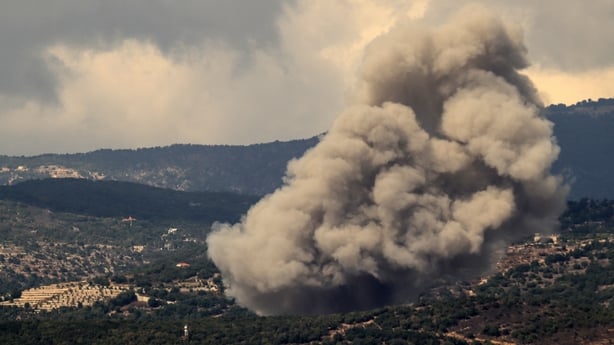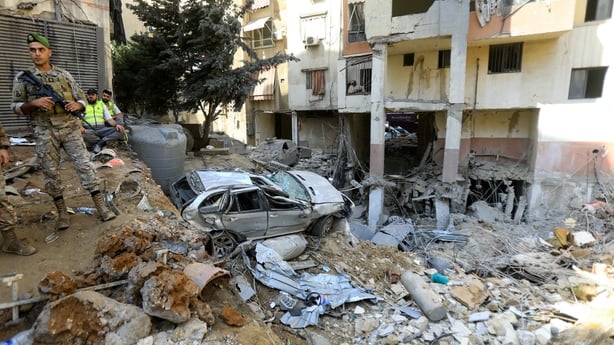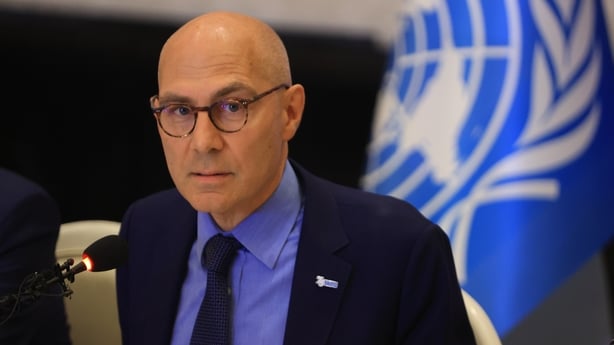Israeli warplanes have been pounding southern Lebanon, raising fears of all-out war a day after an Israeli strike on Beirut left senior Hezbollah commanders among the 37 people Lebanese officials reported killed.
Dozens of Israeli warplanes were "widely" striking Hezbollah targets in southern Lebanon "to eliminate threats against the citizens of Israel," said military spokesman Rear Admiral Daniel Hagari.
Lebanon's official National News Agency reported that Israeli warplanes had launched "a large-scale air attack" this evening over south Lebanon.
The toll from an Israeli air strike targeting Hezbollah military commanders in Beirut's southern suburbs rose to 37 dead, Lebanon's health ministry said.
"The number of dead has risen to 37 people," a ministry statement said, adding that rubble was still being removed from the site of yesterday afternoon's strike.
Israel took out two of Hezbollah's leaders of its elite operations unit in a strike on a command meeting in a Beirut stronghold.
Hezbollah said that a total of 16 of its members were killed in the strike, including senior leader Ibrahim Aqil and another commander, Ahmed Wahbi.

Lebanese Health Minister Firass Abiad said three children were also killed in yesterday's strike on an underground meeting room, which AFP journalists said left a huge crater in a densely populated neighbourhood of the capital's southern suburbs.
The Israeli military said it was again hitting targets "belonging to the Hezbollah terrorist organisation in Lebanon", without elaborating.
Israeli warplanes carried out some of the heaviest bombardment in 11 months of fighting across Lebanon's south and Hezbollah claimed rocket attacks on military targets in Israel's north.
The Israeli army said it hit around 180 targets, destroying thousands of rocket launch barrels.
It said it also targeted a "Hamas command and control centre" in Gaza City it alleged was "embedded inside" a school where rescuers said 22 civilians were killed in adjacent buildings used as a shelter.
Mr Abiad said emergency services worked "through the night" to recover dead and wounded from the Beirut strike, adding that "a residential building collapsed on top of occupants" after the Israeli attack.
The Radwan Force has spearheaded Hezbollah's ground operations, and Israel has repeatedly demanded through international mediators that its fighters be pushed back from the border.
Coming after sabotage attacks on communications devices that killed 37 people in Hezbollah strongholds, yesterday's strike raised new questions about the Iran-backed group's security arrangements.
Hezbollah said a second senior commander, Ahmed Mahmud Wahbi, was also killed.
He headed the group's operations against Israel from the onset of the Gaza war in October until the start of this year.
Confirming the death of Mr Aqil, who was wanted by the United States for involvement in the 1983 bombing of the US embassy in Beirut, Hezbollah hailed him as "one of its great leaders".

It was the second Israeli strike on Hezbollah's military leadership since the Gaza war began. In July, an Israeli strike on Beirut killed Fuad Shukr, a top operations chief.
It also followed sabotage attacks on pagers and two-way radios used by Hezbollah on Tuesday and Wednesday, which killed 37 people.
Stéphane Dujarric, spokesman for UN Secretary-General Antonio Guterres, said the world body was "very concerned about the heightened escalation" and called for "maximum restraint" from all sides.
Israel's military said it conducted a "targeted strike" against Mr Aqil, which a source close to Hezbollah said killed 16 Radwan Force members.
"The command of the Radwan Force was meeting in the basement of the building," the source said.
Washington had offered a $7 million reward for information on Mr Aqil, calling him a "principal member" of an organisation that claimed the 1983 US embassy bombing which killed 63.
We need your consent to load this rte-player contentWe use rte-player to manage extra content that can set cookies on your device and collect data about your activity. Please review their details and accept them to load the content.Manage Preferences
Israeli troops and Hezbollah fighters have battled each other along the Israel-Lebanon border since Hamas militants triggered the war in Gaza with their 7 October attack.
The focus of Israel's firepower for nearly a year has been on Gaza, but with Hamas much weakened, that focus has now moved to Israel's northern border.
Defence Minister Yoav Gallant said Israel's "enemies" would find no refuge, not even in Beirut's southern suburbs.
Military spokesman Daniel Hagari said Israel was "not aiming for a broad escalation in the region".
But Hamas called it a "brutal and terrorist aggression" and an "escalation".
Iran accused Israel of seeking to "broaden the geography of the war".
Months of near-daily cross-border exchanges have killed hundreds in Lebanon, mostly fighters, and dozens in Israel and the annexed Golan Heights, forcing tens of thousands on both sides to flee their homes.
The latest blow to Hezbollah came after thousands of its operatives' pagers and walkie-talkies exploded over two days, killing 37 people and wounding thousands.
Hezbollah chief Hassan Nasrallah vowed Thursday that Israel would face retribution for those blasts.
Israeli Prime Minister Benjamin Netanyahu delayed by a day his departure for the United States, where he is due to address the UN General Assembly.

The UN's High Commissioner for Human Rights, Volker Turk, told the Security Council the attack on Hezbollah communications devices violated international law and could constitute a war crime.
The pagers and walkie-talkies exploded as their users were in supermarkets, walking on streets and attending funerals, plunging Lebanon into panic.
"I am appalled by the breadth and impact of the attacks," said Mr Turk, adding that it "is a war crime to commit violence intended to spread terror among civilians".
The 7 October attacks that triggered the war resulted in the deaths of 1,205 people, mostly civilians, on the Israeli side, according to an AFP tally based on Israeli official figures that include hostages killed in captivity.
Of 251 hostages seized by militants, 97 are still held in Gaza, including 33 the Israeli military says are dead.
Israel's retaliatory military offensive has killed at least 41,391 people in Gaza, most of them civilians, according to figures provided by the Hamas-run territory's health ministry.
The UN has acknowledged the figures as reliable.

